Clinical Care for a Pregnant Woman with Bipolar and Substance Use
VerifiedAdded on 2023/06/10
|7
|2063
|143
Essay
AI Summary
This essay delves into the multifaceted clinical care required for a 21-year-old pregnant woman diagnosed with bipolar disorder and a history of substance abuse. It addresses the critical need to balance the patient's psychiatric and obstetric needs, considering the risks associated with both the illness and substance use during pregnancy. The essay provides a rationale for the study, critically analyzes the challenges, and offers recommendations for care, emphasizing the importance of individualized treatment plans, psycho-education, and the potential use of electroconvulsive therapy. The discussion highlights the complexities of balancing medication use during pregnancy with the risks of untreated psychiatric conditions, as well as the need for comprehensive support for the patient and her family. The essay also emphasizes the importance of collaboration between the healthcare providers to ensure the best possible outcomes for both the mother and the child.
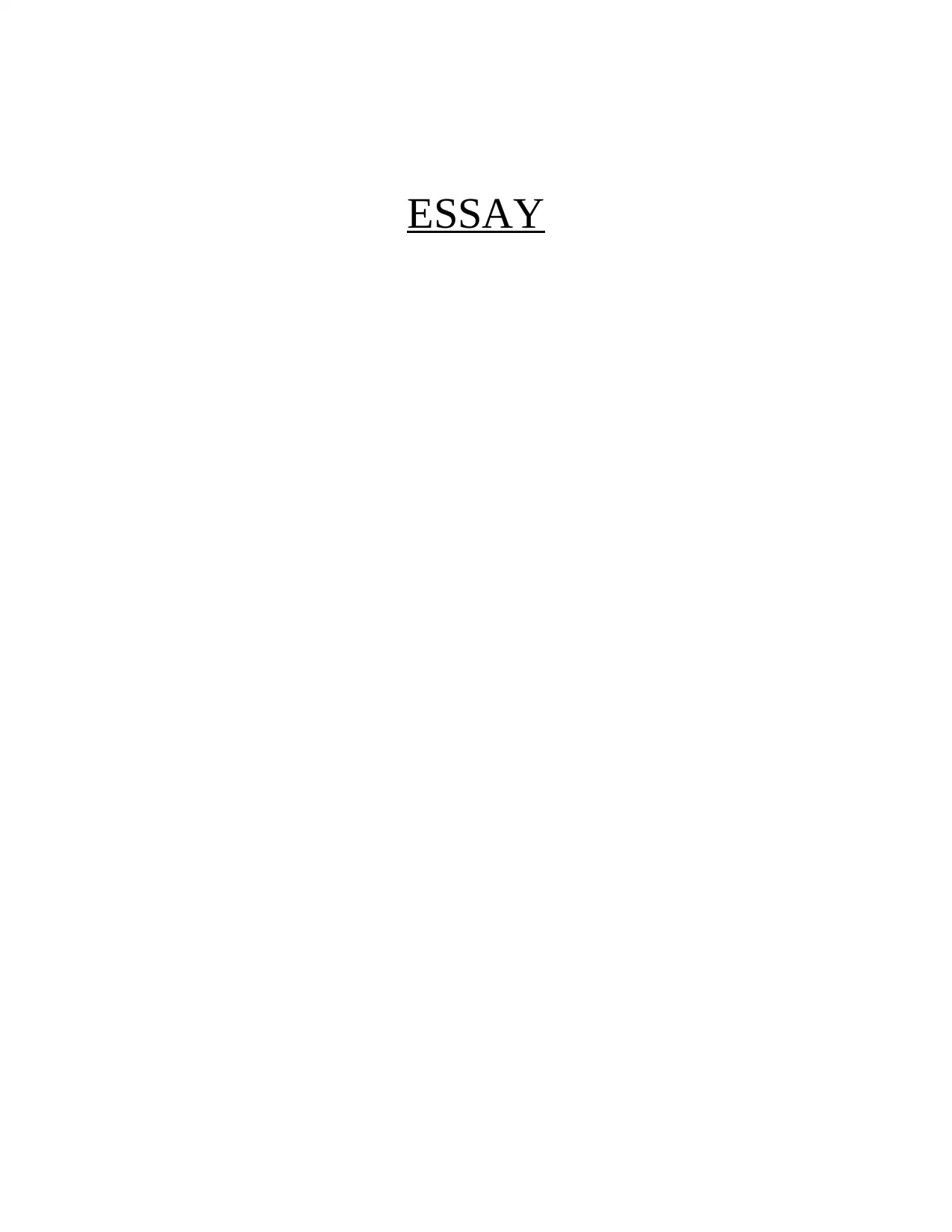
ESSAY
Paraphrase This Document
Need a fresh take? Get an instant paraphrase of this document with our AI Paraphraser
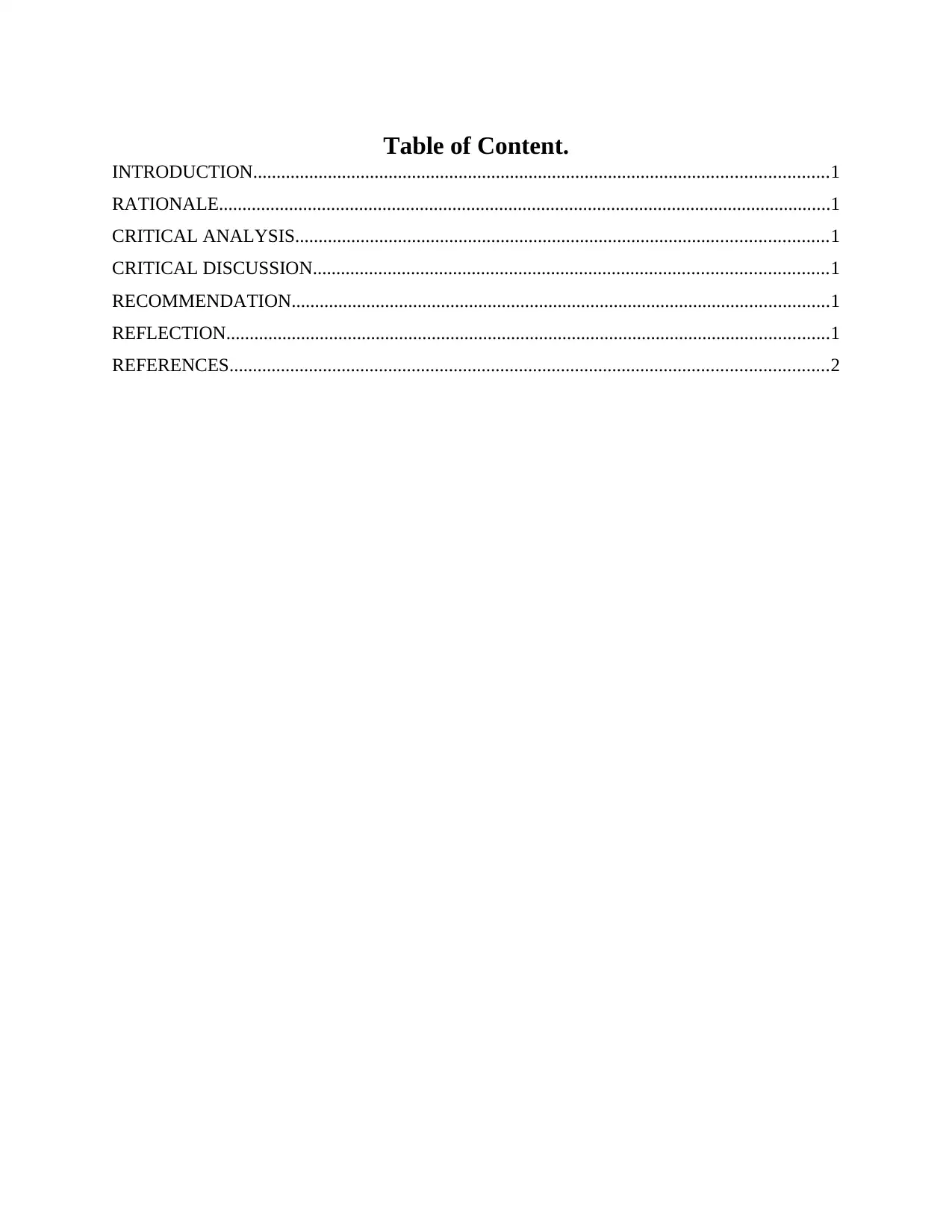
Table of Content.
INTRODUCTION...........................................................................................................................1
RATIONALE...................................................................................................................................1
CRITICAL ANALYSIS..................................................................................................................1
CRITICAL DISCUSSION..............................................................................................................1
RECOMMENDATION...................................................................................................................1
REFLECTION.................................................................................................................................1
REFERENCES................................................................................................................................2
INTRODUCTION...........................................................................................................................1
RATIONALE...................................................................................................................................1
CRITICAL ANALYSIS..................................................................................................................1
CRITICAL DISCUSSION..............................................................................................................1
RECOMMENDATION...................................................................................................................1
REFLECTION.................................................................................................................................1
REFERENCES................................................................................................................................2
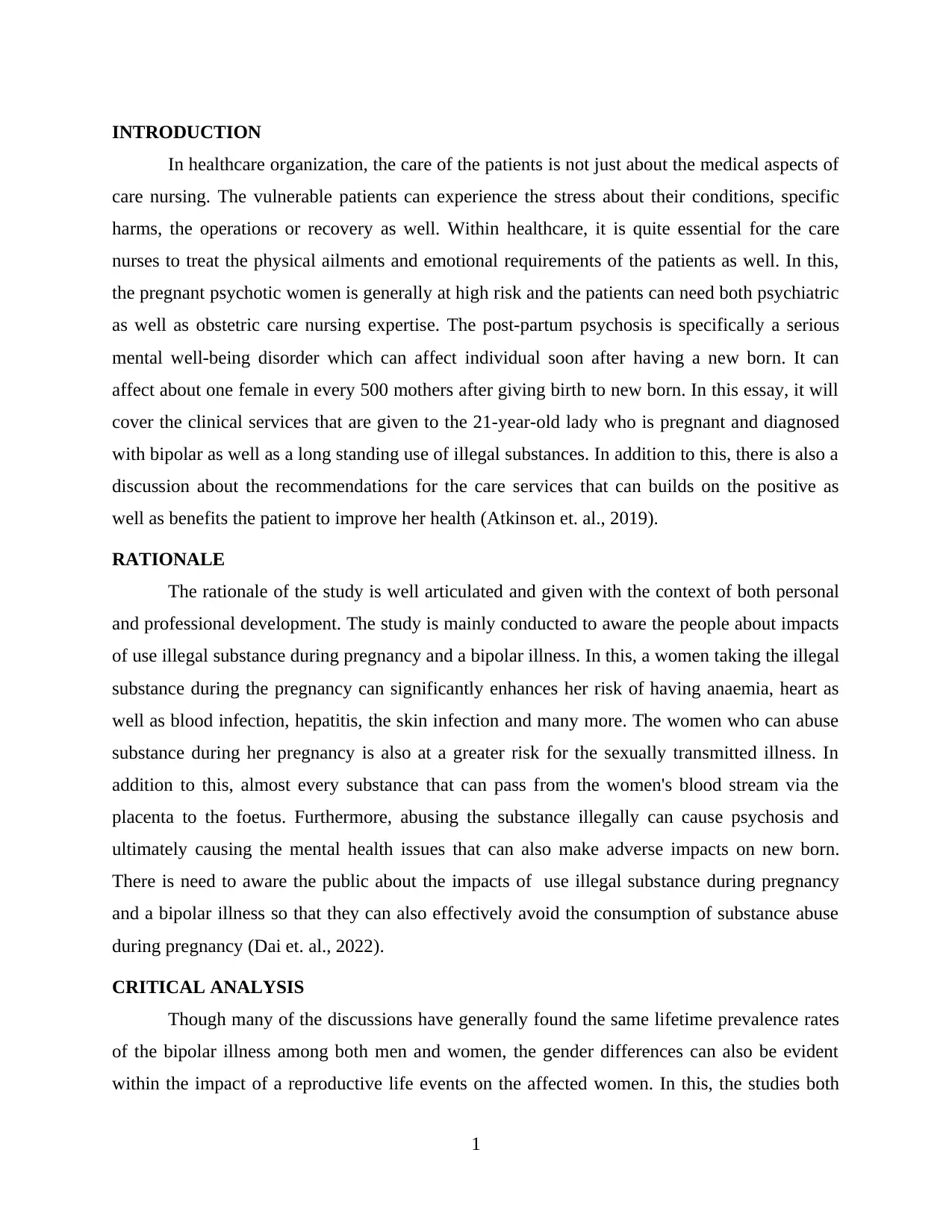
INTRODUCTION
In healthcare organization, the care of the patients is not just about the medical aspects of
care nursing. The vulnerable patients can experience the stress about their conditions, specific
harms, the operations or recovery as well. Within healthcare, it is quite essential for the care
nurses to treat the physical ailments and emotional requirements of the patients as well. In this,
the pregnant psychotic women is generally at high risk and the patients can need both psychiatric
as well as obstetric care nursing expertise. The post-partum psychosis is specifically a serious
mental well-being disorder which can affect individual soon after having a new born. It can
affect about one female in every 500 mothers after giving birth to new born. In this essay, it will
cover the clinical services that are given to the 21-year-old lady who is pregnant and diagnosed
with bipolar as well as a long standing use of illegal substances. In addition to this, there is also a
discussion about the recommendations for the care services that can builds on the positive as
well as benefits the patient to improve her health (Atkinson et. al., 2019).
RATIONALE
The rationale of the study is well articulated and given with the context of both personal
and professional development. The study is mainly conducted to aware the people about impacts
of use illegal substance during pregnancy and a bipolar illness. In this, a women taking the illegal
substance during the pregnancy can significantly enhances her risk of having anaemia, heart as
well as blood infection, hepatitis, the skin infection and many more. The women who can abuse
substance during her pregnancy is also at a greater risk for the sexually transmitted illness. In
addition to this, almost every substance that can pass from the women's blood stream via the
placenta to the foetus. Furthermore, abusing the substance illegally can cause psychosis and
ultimately causing the mental health issues that can also make adverse impacts on new born.
There is need to aware the public about the impacts of use illegal substance during pregnancy
and a bipolar illness so that they can also effectively avoid the consumption of substance abuse
during pregnancy (Dai et. al., 2022).
CRITICAL ANALYSIS
Though many of the discussions have generally found the same lifetime prevalence rates
of the bipolar illness among both men and women, the gender differences can also be evident
within the impact of a reproductive life events on the affected women. In this, the studies both
1
In healthcare organization, the care of the patients is not just about the medical aspects of
care nursing. The vulnerable patients can experience the stress about their conditions, specific
harms, the operations or recovery as well. Within healthcare, it is quite essential for the care
nurses to treat the physical ailments and emotional requirements of the patients as well. In this,
the pregnant psychotic women is generally at high risk and the patients can need both psychiatric
as well as obstetric care nursing expertise. The post-partum psychosis is specifically a serious
mental well-being disorder which can affect individual soon after having a new born. It can
affect about one female in every 500 mothers after giving birth to new born. In this essay, it will
cover the clinical services that are given to the 21-year-old lady who is pregnant and diagnosed
with bipolar as well as a long standing use of illegal substances. In addition to this, there is also a
discussion about the recommendations for the care services that can builds on the positive as
well as benefits the patient to improve her health (Atkinson et. al., 2019).
RATIONALE
The rationale of the study is well articulated and given with the context of both personal
and professional development. The study is mainly conducted to aware the people about impacts
of use illegal substance during pregnancy and a bipolar illness. In this, a women taking the illegal
substance during the pregnancy can significantly enhances her risk of having anaemia, heart as
well as blood infection, hepatitis, the skin infection and many more. The women who can abuse
substance during her pregnancy is also at a greater risk for the sexually transmitted illness. In
addition to this, almost every substance that can pass from the women's blood stream via the
placenta to the foetus. Furthermore, abusing the substance illegally can cause psychosis and
ultimately causing the mental health issues that can also make adverse impacts on new born.
There is need to aware the public about the impacts of use illegal substance during pregnancy
and a bipolar illness so that they can also effectively avoid the consumption of substance abuse
during pregnancy (Dai et. al., 2022).
CRITICAL ANALYSIS
Though many of the discussions have generally found the same lifetime prevalence rates
of the bipolar illness among both men and women, the gender differences can also be evident
within the impact of a reproductive life events on the affected women. In this, the studies both
1
⊘ This is a preview!⊘
Do you want full access?
Subscribe today to unlock all pages.

Trusted by 1+ million students worldwide
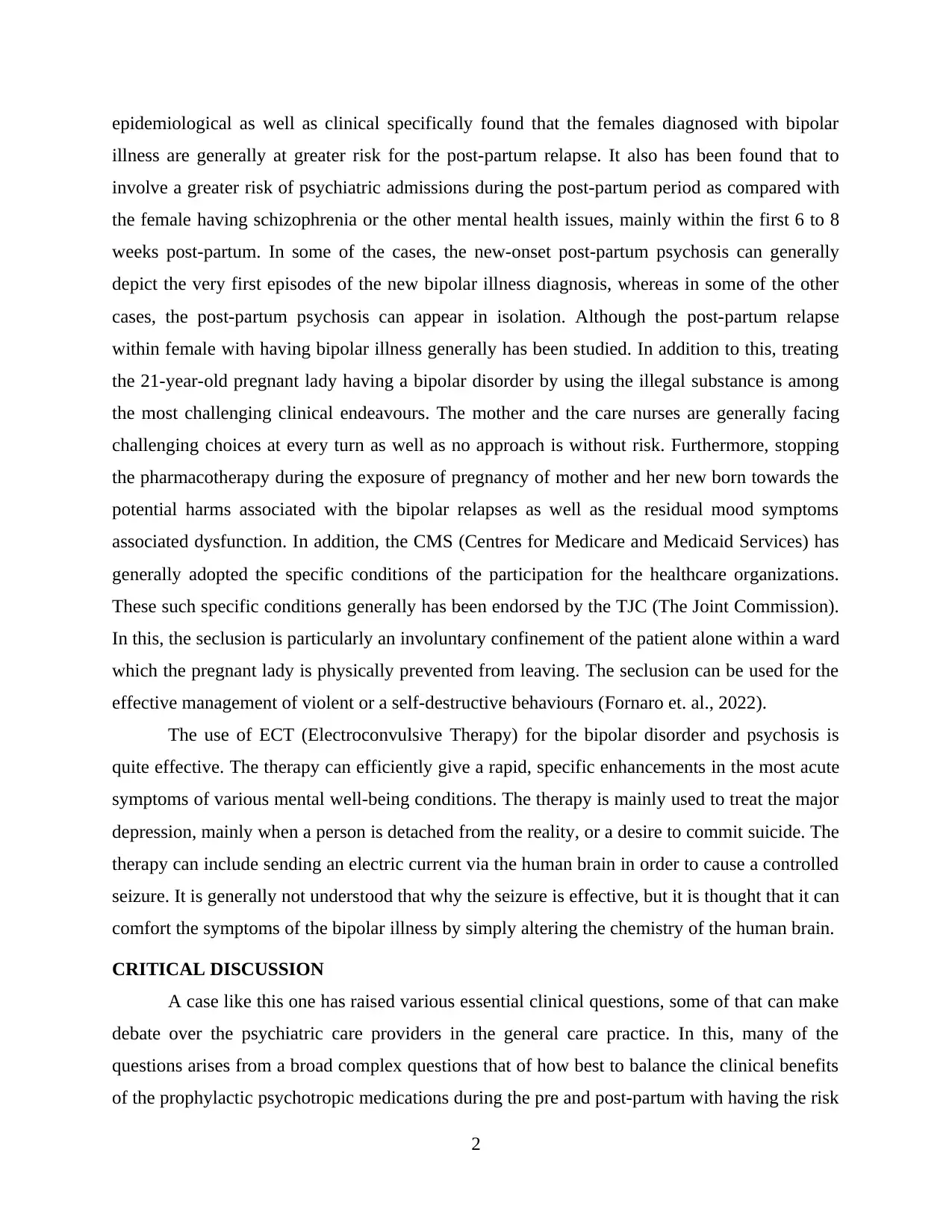
epidemiological as well as clinical specifically found that the females diagnosed with bipolar
illness are generally at greater risk for the post-partum relapse. It also has been found that to
involve a greater risk of psychiatric admissions during the post-partum period as compared with
the female having schizophrenia or the other mental health issues, mainly within the first 6 to 8
weeks post-partum. In some of the cases, the new-onset post-partum psychosis can generally
depict the very first episodes of the new bipolar illness diagnosis, whereas in some of the other
cases, the post-partum psychosis can appear in isolation. Although the post-partum relapse
within female with having bipolar illness generally has been studied. In addition to this, treating
the 21-year-old pregnant lady having a bipolar disorder by using the illegal substance is among
the most challenging clinical endeavours. The mother and the care nurses are generally facing
challenging choices at every turn as well as no approach is without risk. Furthermore, stopping
the pharmacotherapy during the exposure of pregnancy of mother and her new born towards the
potential harms associated with the bipolar relapses as well as the residual mood symptoms
associated dysfunction. In addition, the CMS (Centres for Medicare and Medicaid Services) has
generally adopted the specific conditions of the participation for the healthcare organizations.
These such specific conditions generally has been endorsed by the TJC (The Joint Commission).
In this, the seclusion is particularly an involuntary confinement of the patient alone within a ward
which the pregnant lady is physically prevented from leaving. The seclusion can be used for the
effective management of violent or a self-destructive behaviours (Fornaro et. al., 2022).
The use of ECT (Electroconvulsive Therapy) for the bipolar disorder and psychosis is
quite effective. The therapy can efficiently give a rapid, specific enhancements in the most acute
symptoms of various mental well-being conditions. The therapy is mainly used to treat the major
depression, mainly when a person is detached from the reality, or a desire to commit suicide. The
therapy can include sending an electric current via the human brain in order to cause a controlled
seizure. It is generally not understood that why the seizure is effective, but it is thought that it can
comfort the symptoms of the bipolar illness by simply altering the chemistry of the human brain.
CRITICAL DISCUSSION
A case like this one has raised various essential clinical questions, some of that can make
debate over the psychiatric care providers in the general care practice. In this, many of the
questions arises from a broad complex questions that of how best to balance the clinical benefits
of the prophylactic psychotropic medications during the pre and post-partum with having the risk
2
illness are generally at greater risk for the post-partum relapse. It also has been found that to
involve a greater risk of psychiatric admissions during the post-partum period as compared with
the female having schizophrenia or the other mental health issues, mainly within the first 6 to 8
weeks post-partum. In some of the cases, the new-onset post-partum psychosis can generally
depict the very first episodes of the new bipolar illness diagnosis, whereas in some of the other
cases, the post-partum psychosis can appear in isolation. Although the post-partum relapse
within female with having bipolar illness generally has been studied. In addition to this, treating
the 21-year-old pregnant lady having a bipolar disorder by using the illegal substance is among
the most challenging clinical endeavours. The mother and the care nurses are generally facing
challenging choices at every turn as well as no approach is without risk. Furthermore, stopping
the pharmacotherapy during the exposure of pregnancy of mother and her new born towards the
potential harms associated with the bipolar relapses as well as the residual mood symptoms
associated dysfunction. In addition, the CMS (Centres for Medicare and Medicaid Services) has
generally adopted the specific conditions of the participation for the healthcare organizations.
These such specific conditions generally has been endorsed by the TJC (The Joint Commission).
In this, the seclusion is particularly an involuntary confinement of the patient alone within a ward
which the pregnant lady is physically prevented from leaving. The seclusion can be used for the
effective management of violent or a self-destructive behaviours (Fornaro et. al., 2022).
The use of ECT (Electroconvulsive Therapy) for the bipolar disorder and psychosis is
quite effective. The therapy can efficiently give a rapid, specific enhancements in the most acute
symptoms of various mental well-being conditions. The therapy is mainly used to treat the major
depression, mainly when a person is detached from the reality, or a desire to commit suicide. The
therapy can include sending an electric current via the human brain in order to cause a controlled
seizure. It is generally not understood that why the seizure is effective, but it is thought that it can
comfort the symptoms of the bipolar illness by simply altering the chemistry of the human brain.
CRITICAL DISCUSSION
A case like this one has raised various essential clinical questions, some of that can make
debate over the psychiatric care providers in the general care practice. In this, many of the
questions arises from a broad complex questions that of how best to balance the clinical benefits
of the prophylactic psychotropic medications during the pre and post-partum with having the risk
2
Paraphrase This Document
Need a fresh take? Get an instant paraphrase of this document with our AI Paraphraser
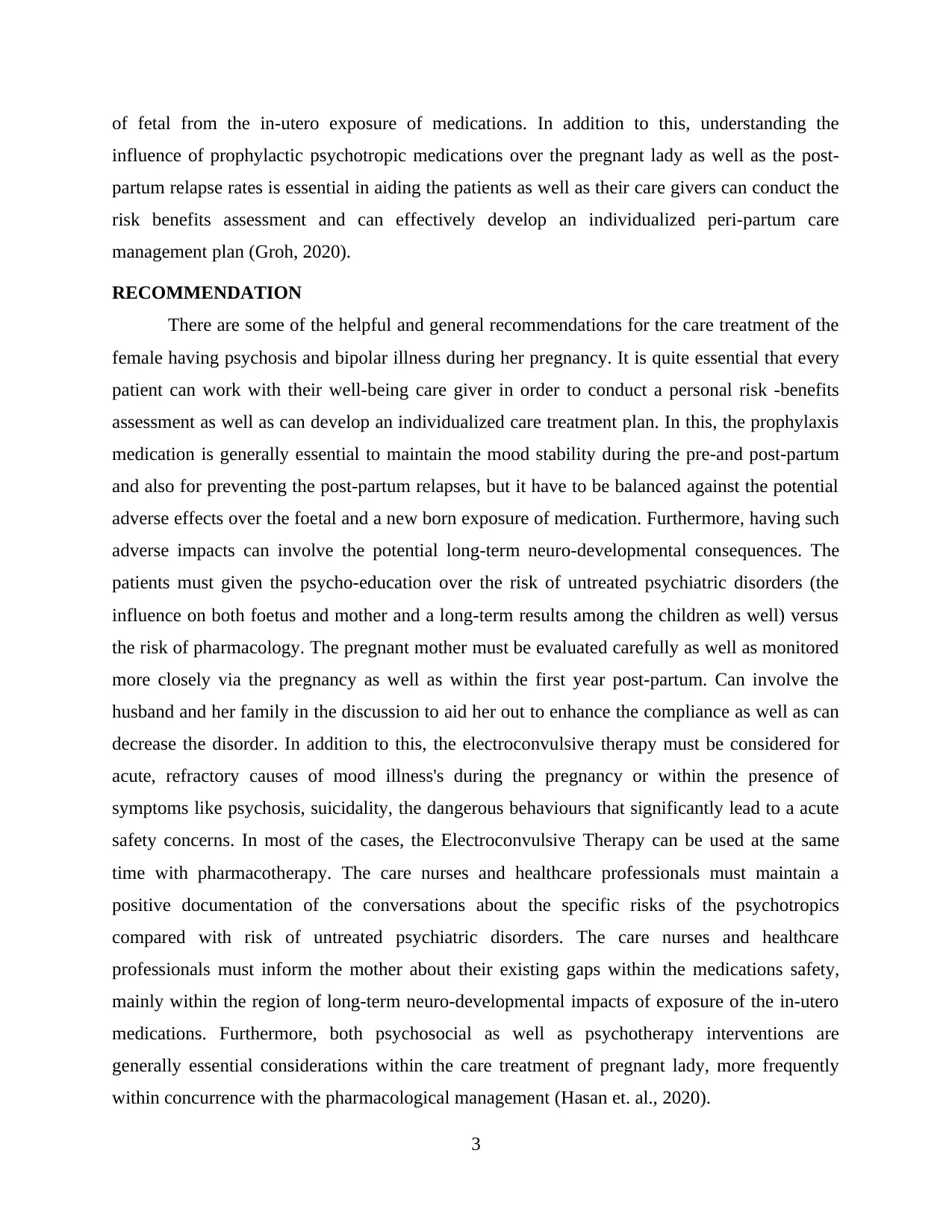
of fetal from the in-utero exposure of medications. In addition to this, understanding the
influence of prophylactic psychotropic medications over the pregnant lady as well as the post-
partum relapse rates is essential in aiding the patients as well as their care givers can conduct the
risk benefits assessment and can effectively develop an individualized peri-partum care
management plan (Groh, 2020).
RECOMMENDATION
There are some of the helpful and general recommendations for the care treatment of the
female having psychosis and bipolar illness during her pregnancy. It is quite essential that every
patient can work with their well-being care giver in order to conduct a personal risk -benefits
assessment as well as can develop an individualized care treatment plan. In this, the prophylaxis
medication is generally essential to maintain the mood stability during the pre-and post-partum
and also for preventing the post-partum relapses, but it have to be balanced against the potential
adverse effects over the foetal and a new born exposure of medication. Furthermore, having such
adverse impacts can involve the potential long-term neuro-developmental consequences. The
patients must given the psycho-education over the risk of untreated psychiatric disorders (the
influence on both foetus and mother and a long-term results among the children as well) versus
the risk of pharmacology. The pregnant mother must be evaluated carefully as well as monitored
more closely via the pregnancy as well as within the first year post-partum. Can involve the
husband and her family in the discussion to aid her out to enhance the compliance as well as can
decrease the disorder. In addition to this, the electroconvulsive therapy must be considered for
acute, refractory causes of mood illness's during the pregnancy or within the presence of
symptoms like psychosis, suicidality, the dangerous behaviours that significantly lead to a acute
safety concerns. In most of the cases, the Electroconvulsive Therapy can be used at the same
time with pharmacotherapy. The care nurses and healthcare professionals must maintain a
positive documentation of the conversations about the specific risks of the psychotropics
compared with risk of untreated psychiatric disorders. The care nurses and healthcare
professionals must inform the mother about their existing gaps within the medications safety,
mainly within the region of long-term neuro-developmental impacts of exposure of the in-utero
medications. Furthermore, both psychosocial as well as psychotherapy interventions are
generally essential considerations within the care treatment of pregnant lady, more frequently
within concurrence with the pharmacological management (Hasan et. al., 2020).
3
influence of prophylactic psychotropic medications over the pregnant lady as well as the post-
partum relapse rates is essential in aiding the patients as well as their care givers can conduct the
risk benefits assessment and can effectively develop an individualized peri-partum care
management plan (Groh, 2020).
RECOMMENDATION
There are some of the helpful and general recommendations for the care treatment of the
female having psychosis and bipolar illness during her pregnancy. It is quite essential that every
patient can work with their well-being care giver in order to conduct a personal risk -benefits
assessment as well as can develop an individualized care treatment plan. In this, the prophylaxis
medication is generally essential to maintain the mood stability during the pre-and post-partum
and also for preventing the post-partum relapses, but it have to be balanced against the potential
adverse effects over the foetal and a new born exposure of medication. Furthermore, having such
adverse impacts can involve the potential long-term neuro-developmental consequences. The
patients must given the psycho-education over the risk of untreated psychiatric disorders (the
influence on both foetus and mother and a long-term results among the children as well) versus
the risk of pharmacology. The pregnant mother must be evaluated carefully as well as monitored
more closely via the pregnancy as well as within the first year post-partum. Can involve the
husband and her family in the discussion to aid her out to enhance the compliance as well as can
decrease the disorder. In addition to this, the electroconvulsive therapy must be considered for
acute, refractory causes of mood illness's during the pregnancy or within the presence of
symptoms like psychosis, suicidality, the dangerous behaviours that significantly lead to a acute
safety concerns. In most of the cases, the Electroconvulsive Therapy can be used at the same
time with pharmacotherapy. The care nurses and healthcare professionals must maintain a
positive documentation of the conversations about the specific risks of the psychotropics
compared with risk of untreated psychiatric disorders. The care nurses and healthcare
professionals must inform the mother about their existing gaps within the medications safety,
mainly within the region of long-term neuro-developmental impacts of exposure of the in-utero
medications. Furthermore, both psychosocial as well as psychotherapy interventions are
generally essential considerations within the care treatment of pregnant lady, more frequently
within concurrence with the pharmacological management (Hasan et. al., 2020).
3
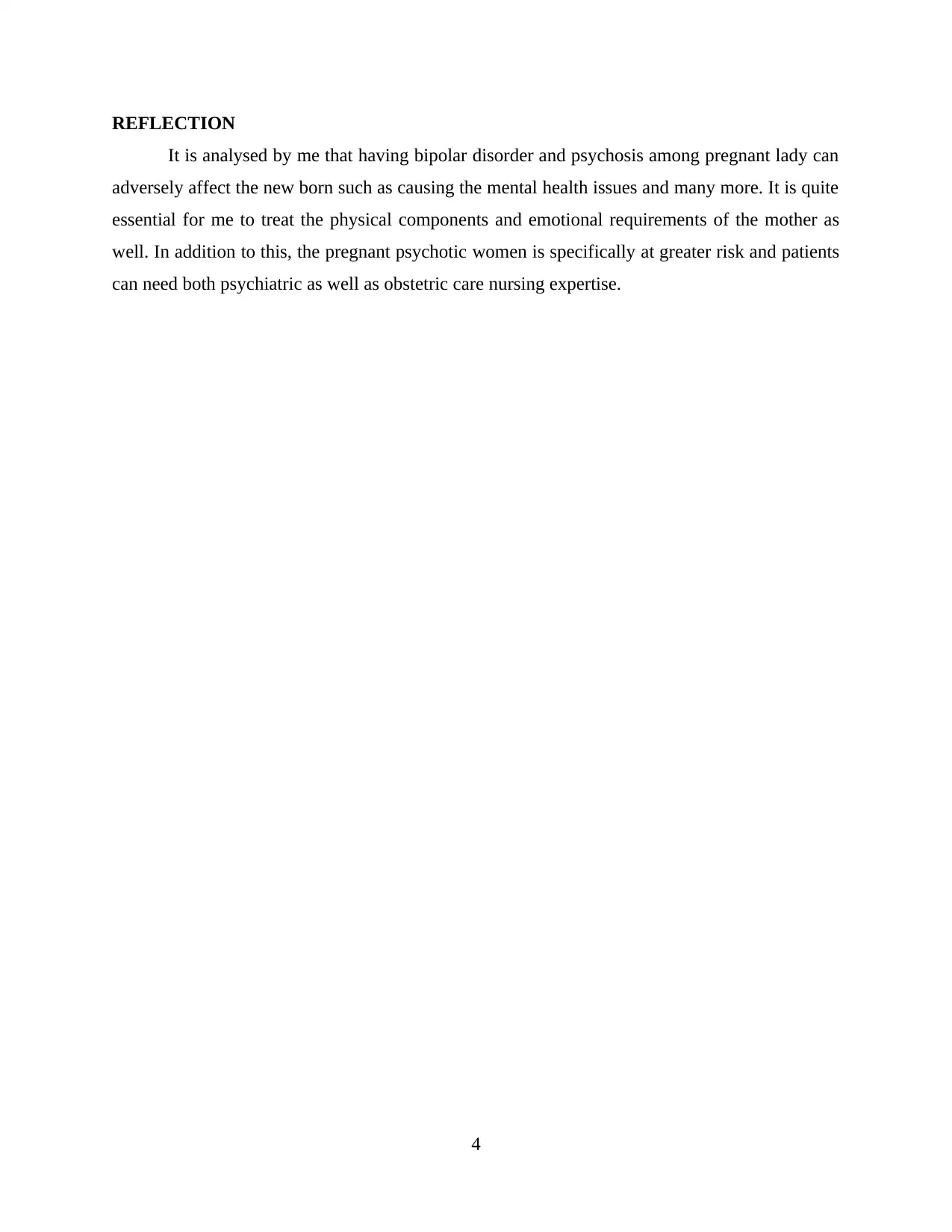
REFLECTION
It is analysed by me that having bipolar disorder and psychosis among pregnant lady can
adversely affect the new born such as causing the mental health issues and many more. It is quite
essential for me to treat the physical components and emotional requirements of the mother as
well. In addition to this, the pregnant psychotic women is specifically at greater risk and patients
can need both psychiatric as well as obstetric care nursing expertise.
4
It is analysed by me that having bipolar disorder and psychosis among pregnant lady can
adversely affect the new born such as causing the mental health issues and many more. It is quite
essential for me to treat the physical components and emotional requirements of the mother as
well. In addition to this, the pregnant psychotic women is specifically at greater risk and patients
can need both psychiatric as well as obstetric care nursing expertise.
4
⊘ This is a preview!⊘
Do you want full access?
Subscribe today to unlock all pages.

Trusted by 1+ million students worldwide
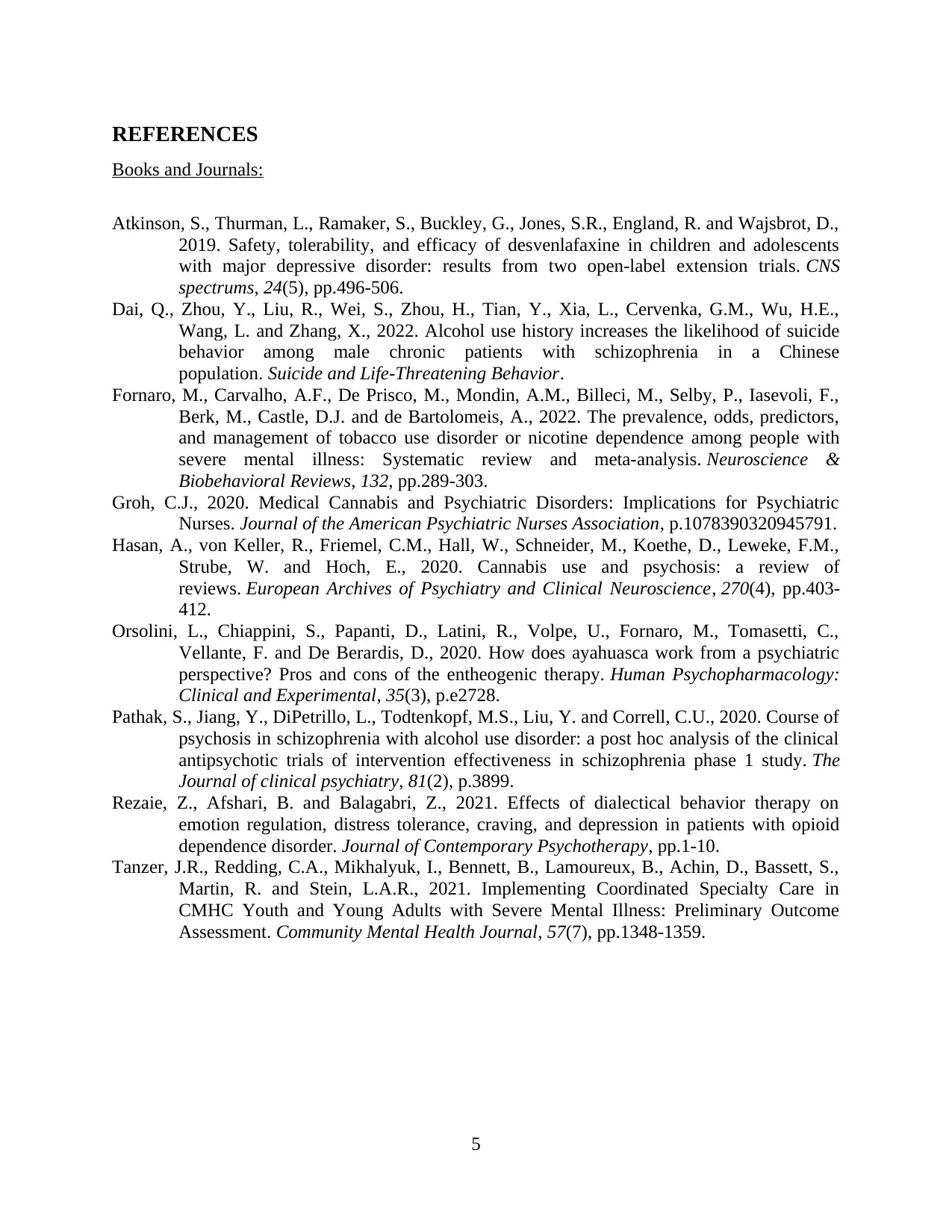
REFERENCES
Books and Journals:
Atkinson, S., Thurman, L., Ramaker, S., Buckley, G., Jones, S.R., England, R. and Wajsbrot, D.,
2019. Safety, tolerability, and efficacy of desvenlafaxine in children and adolescents
with major depressive disorder: results from two open-label extension trials. CNS
spectrums, 24(5), pp.496-506.
Dai, Q., Zhou, Y., Liu, R., Wei, S., Zhou, H., Tian, Y., Xia, L., Cervenka, G.M., Wu, H.E.,
Wang, L. and Zhang, X., 2022. Alcohol use history increases the likelihood of suicide
behavior among male chronic patients with schizophrenia in a Chinese
population. Suicide and Life‐Threatening Behavior.
Fornaro, M., Carvalho, A.F., De Prisco, M., Mondin, A.M., Billeci, M., Selby, P., Iasevoli, F.,
Berk, M., Castle, D.J. and de Bartolomeis, A., 2022. The prevalence, odds, predictors,
and management of tobacco use disorder or nicotine dependence among people with
severe mental illness: Systematic review and meta-analysis. Neuroscience &
Biobehavioral Reviews, 132, pp.289-303.
Groh, C.J., 2020. Medical Cannabis and Psychiatric Disorders: Implications for Psychiatric
Nurses. Journal of the American Psychiatric Nurses Association, p.1078390320945791.
Hasan, A., von Keller, R., Friemel, C.M., Hall, W., Schneider, M., Koethe, D., Leweke, F.M.,
Strube, W. and Hoch, E., 2020. Cannabis use and psychosis: a review of
reviews. European Archives of Psychiatry and Clinical Neuroscience, 270(4), pp.403-
412.
Orsolini, L., Chiappini, S., Papanti, D., Latini, R., Volpe, U., Fornaro, M., Tomasetti, C.,
Vellante, F. and De Berardis, D., 2020. How does ayahuasca work from a psychiatric
perspective? Pros and cons of the entheogenic therapy. Human Psychopharmacology:
Clinical and Experimental, 35(3), p.e2728.
Pathak, S., Jiang, Y., DiPetrillo, L., Todtenkopf, M.S., Liu, Y. and Correll, C.U., 2020. Course of
psychosis in schizophrenia with alcohol use disorder: a post hoc analysis of the clinical
antipsychotic trials of intervention effectiveness in schizophrenia phase 1 study. The
Journal of clinical psychiatry, 81(2), p.3899.
Rezaie, Z., Afshari, B. and Balagabri, Z., 2021. Effects of dialectical behavior therapy on
emotion regulation, distress tolerance, craving, and depression in patients with opioid
dependence disorder. Journal of Contemporary Psychotherapy, pp.1-10.
Tanzer, J.R., Redding, C.A., Mikhalyuk, I., Bennett, B., Lamoureux, B., Achin, D., Bassett, S.,
Martin, R. and Stein, L.A.R., 2021. Implementing Coordinated Specialty Care in
CMHC Youth and Young Adults with Severe Mental Illness: Preliminary Outcome
Assessment. Community Mental Health Journal, 57(7), pp.1348-1359.
5
Books and Journals:
Atkinson, S., Thurman, L., Ramaker, S., Buckley, G., Jones, S.R., England, R. and Wajsbrot, D.,
2019. Safety, tolerability, and efficacy of desvenlafaxine in children and adolescents
with major depressive disorder: results from two open-label extension trials. CNS
spectrums, 24(5), pp.496-506.
Dai, Q., Zhou, Y., Liu, R., Wei, S., Zhou, H., Tian, Y., Xia, L., Cervenka, G.M., Wu, H.E.,
Wang, L. and Zhang, X., 2022. Alcohol use history increases the likelihood of suicide
behavior among male chronic patients with schizophrenia in a Chinese
population. Suicide and Life‐Threatening Behavior.
Fornaro, M., Carvalho, A.F., De Prisco, M., Mondin, A.M., Billeci, M., Selby, P., Iasevoli, F.,
Berk, M., Castle, D.J. and de Bartolomeis, A., 2022. The prevalence, odds, predictors,
and management of tobacco use disorder or nicotine dependence among people with
severe mental illness: Systematic review and meta-analysis. Neuroscience &
Biobehavioral Reviews, 132, pp.289-303.
Groh, C.J., 2020. Medical Cannabis and Psychiatric Disorders: Implications for Psychiatric
Nurses. Journal of the American Psychiatric Nurses Association, p.1078390320945791.
Hasan, A., von Keller, R., Friemel, C.M., Hall, W., Schneider, M., Koethe, D., Leweke, F.M.,
Strube, W. and Hoch, E., 2020. Cannabis use and psychosis: a review of
reviews. European Archives of Psychiatry and Clinical Neuroscience, 270(4), pp.403-
412.
Orsolini, L., Chiappini, S., Papanti, D., Latini, R., Volpe, U., Fornaro, M., Tomasetti, C.,
Vellante, F. and De Berardis, D., 2020. How does ayahuasca work from a psychiatric
perspective? Pros and cons of the entheogenic therapy. Human Psychopharmacology:
Clinical and Experimental, 35(3), p.e2728.
Pathak, S., Jiang, Y., DiPetrillo, L., Todtenkopf, M.S., Liu, Y. and Correll, C.U., 2020. Course of
psychosis in schizophrenia with alcohol use disorder: a post hoc analysis of the clinical
antipsychotic trials of intervention effectiveness in schizophrenia phase 1 study. The
Journal of clinical psychiatry, 81(2), p.3899.
Rezaie, Z., Afshari, B. and Balagabri, Z., 2021. Effects of dialectical behavior therapy on
emotion regulation, distress tolerance, craving, and depression in patients with opioid
dependence disorder. Journal of Contemporary Psychotherapy, pp.1-10.
Tanzer, J.R., Redding, C.A., Mikhalyuk, I., Bennett, B., Lamoureux, B., Achin, D., Bassett, S.,
Martin, R. and Stein, L.A.R., 2021. Implementing Coordinated Specialty Care in
CMHC Youth and Young Adults with Severe Mental Illness: Preliminary Outcome
Assessment. Community Mental Health Journal, 57(7), pp.1348-1359.
5
1 out of 7
Related Documents
Your All-in-One AI-Powered Toolkit for Academic Success.
+13062052269
info@desklib.com
Available 24*7 on WhatsApp / Email
![[object Object]](/_next/static/media/star-bottom.7253800d.svg)
Unlock your academic potential
Copyright © 2020–2025 A2Z Services. All Rights Reserved. Developed and managed by ZUCOL.





